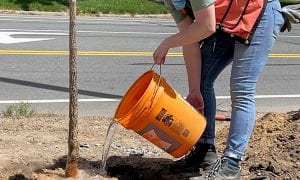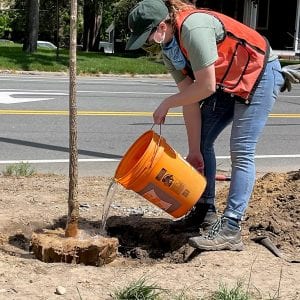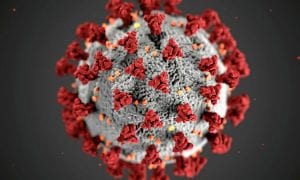WESTFIELD- Ward 3 City Councilor Bridget Matthews-Kane took part in a remote panel this week to discuss being safe during the holidays in the era of COVID-19.
The Sunday evening panel was streamed on Facebook and consisted of Councilor Matthews-Kane, Marlborough City Councilor At-Large Samantha Perlman and Wellesley Selectwoman Lise Olney. The three officials posed questions to Dr. Natalia Linos, executive director at the FXB Center for Health and Human Rights at Harvard University and Dr. Regina LaRocque, Infectious Disease specialist at Massachusetts General Hospital and Harvard Medical School.
“From my perspective, for the last nine months we have had a wildfire going in our country,” said LaRocque, “It was quite remarkable here in Massachusetts and it never really went out.
We had a slow burn from late summer to early fall, now it is roaring back here and in the rest of the country.”
She said that the fact that this surge in infections is happening as the holiday season is here may cause an acceleration in infection rates.
Linos said that the numbers being reported across the state in recent weeks are close to what was being reported at the height of the first wave in the spring. She added that indoor dining should be avoided, as it is a scenario that causes further spread of COVID-19.
She and LaRocque also said that the best way to prevent the spread of COVID-19 during Thanksgiving and Christmas is to only spend it with those who are already in your “cohort” or household.
If one has made the decision to have an extended Thanksgiving or Christmas dinner, there are strategies to mitigate the spread.
Linos said that young adults should likely be wearing masks around those in their family who are at-risk or older. Much of the spread of COVID-19 during the current wave thus far has been among young adults.
LaRocque said that, if possible, one should eat outside or open their windows. One could also have people seated at different tables throughout the house. She also said that minimizing the sharing of utensils will help as well.
LaRocque advised against relying on tests ahead of the holiday dinner to clear individuals before they gather. She said that a negative test does not necessarily mean a person does not have COVID-19. One could have been infected but not yet incubated enough of the virus to be detectable by a test. Someone could also become infected between being tested and having their holiday dinner.
Linos said that if someone is traveling to visit family, they should take the utmost care and follow all guidelines for two weeks leading up to the visit.
Councilor Perlman asked the doctors what local officials should be advocating for to best keep their residents safe. Linos said that officials should think about people who may be unable to follow guidelines through no fault of their own, and provide them with help to do so.
“Our society is set up in a way that people who can protect themselves can take these extra measures,” said Linos, “With COVID we need to level the playing ground a little bit more.”
LaRocque said that having better employee protections and safer workplaces will be important as the pandemic worsens. She said that many businesses and communities that don’t have the means to follow COVID-19 guidelines consist of immigrant communities and communities with many people of color.
“What we need to be advocating for is equity in our state and health. We need progressive revenue and we need to put more resources and people towards this problem,” said LaRocque.
Both doctors touched on the notion that there has been a problem with mixed messages coming from positions of leadership for the duration of the pandemic. Linos said that politisization of health measures like masks has led to misinformation about how they work. Linos said that she has encountered people who believe that a mask will make you sick, when that is not the case.
Larocque said that having trusted and reliable sources of information is key to managing a pandemic. She said that she believes that much of the misinformation and mixed messaging came from outgoing President Donald J. Trump.
There is what the panelists were hopeful is a light at the end of the tunnel with three vaccine candidates reporting extremely promising results in recent weeks. The first doses of the vaccine could be administered in the country by the end of 2020, but most people may not get theirs until sometime in 2021.
LaRocque said that making the vaccine is one thing, but the logistical problem of getting the vaccine to everybody in the country still remains. Each of the vaccine candidates have different storage requirements that are not necessarily readily available to a lot of municipalities.
Linos said to those who are anxious about taking a such a rapidly produced vaccine that she plans on getting it herself as soon as it is available to her.







